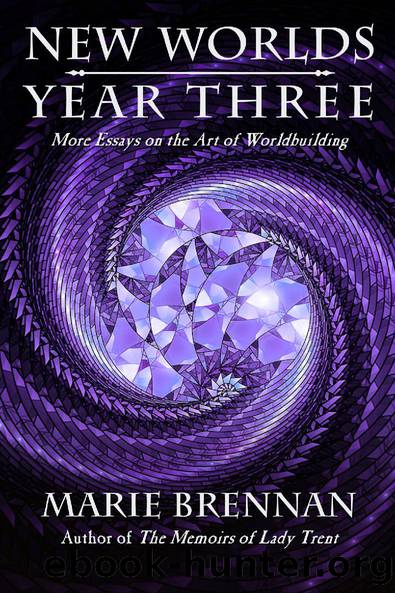New Worlds, Year Three: More Essays on the Art of Worldbuilding by Marie Brennan

Author:Marie Brennan [Brennan, Marie]
Language: eng
Format: epub
Tags: Writing Advice, how to, Worldbuilding, Fantasy, Science Fiction, instruction
Publisher: Book View Cafe
Published: 2020-04-07T07:00:00+00:00
Poison
(1/24/20)
It might seem odd to bundle a discussion of poison in with our exploration of medicine, but as the sixteenth-century Swiss physician known as Paracelsus said, âAll things are poison, and nothing is without poison; the dosage alone makes it so a thing is not a poison.â
Paracelsus was a pioneer in the use of chemistry in medicine, and the idea that physicians ought to understand the basics of that field. His ideas werenât completely modernâhe leaned heavily on the principles of hermeticism, too, developing them into his own equivalent three-humor frameworkâbut he believed in the importance of antisepsis (rather than assuming that infection was a natural and even desirable part of the healing process), and he understood that not only could poisonous substances sometimes have benefits, but beneficial substances could also be dangerous.
Think of foxgloves. This genus of flowers contains a chemical thatâs useful in treating cardiac problemsâbut if you want to give your patient a heart attack instead, all you have to do is feed them more than the useful dosage. Heck, even drinking too much water can kill you, by disrupting the balance of your electrolytes until your brain shuts down. On the flip side, I mentioned mercury treatments for syphilis before; they werenât a great treatment, not least because their side effects were so terribleâ¦but then again, having syphilis wasnât ideal, either. The modern comparison might be chemotherapy, which amounts to attempting to poison a cancerous tumor without killing the patient around it.
But determining the proper dosage can be a tricky challenge, because a host of factors can affect how someone metabolizes a given medication, and what side effects they show. And I mentioned the placebo effect before, but weâre also starting to pay attention to its counterpart, the nocebo effect: just as someone is more likely to get better if they think theyâre taking medicine, knowing about a possible side effect makes it more likely that youâll experience it.
As you might imagine, this makes things complicated for physicians. This is probably why the laws of Tang Dynasty China made it a crime for a physician to diverge from the instructions given in medical texts when treating the emperor. Hewing to the advice therein might still fail to work, cause unpleasant side effects, or even result in the emperorâs deathâ¦but being able to say âI followed the instructions to the letterâ is a form of protection. A doctor who experiments with something new might be acclaimed if it works, but if it doesnât, heâs at high risk of being accused of having killed his patient.
Of course, sometimes that was the goal. Iâm not going to attempt to give a comprehensive overview of the types of poison (here taken in the sense of âthings normally used to kill someone,â not medicines you can overdose on); if you want details on that, Writerâs Digest published a book years ago called Deadly Doses: A Writerâs Guide to Poison. Mithridates VI, King of Pontus, famously consumed sub-lethal doses of various toxins to build up an immunity after his father was poisoned at a banquet in 120 B.
Download
This site does not store any files on its server. We only index and link to content provided by other sites. Please contact the content providers to delete copyright contents if any and email us, we'll remove relevant links or contents immediately.
Autoboyography by Christina Lauren(4701)
Asking the Right Questions: A Guide to Critical Thinking by M. Neil Browne & Stuart M. Keeley(4639)
Dialogue by Robert McKee(3631)
Eat That Frog! by Brian Tracy(3562)
Sticky Fingers by Joe Hagan(3474)
Journeys Out of the Body by Robert Monroe(3028)
Elements of Style 2017 by Richard De A'Morelli(2961)
Annapurna by Maurice Herzog(2874)
Schaum's Quick Guide to Writing Great Short Stories by Margaret Lucke(2828)
Full Circle by Michael Palin(2803)
The Diviners by Libba Bray(2467)
The Art of Dramatic Writing: Its Basis in the Creative Interpretation of Human Motives by Egri Lajos(2438)
The Mental Game of Writing: How to Overcome Obstacles, Stay Creative and Productive, and Free Your Mind for Success by James Scott Bell(2412)
Why I Write by George Orwell(2387)
Atlas Obscura by Joshua Foer(2369)
In Patagonia by Bruce Chatwin(2297)
The Fight by Norman Mailer(2178)
The Elements of Style by William Strunk and E. B. White(2088)
Venice by Jan Morris(2071)
